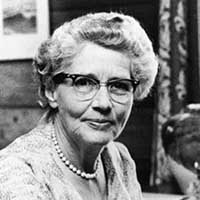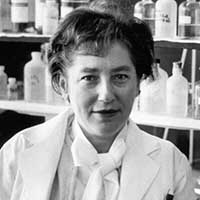Women in AHA Research
Supporting Female Researchers
The AHA’s research program has a proud reputation of leadership and participation of women. As science and medical professionals advance in their careers, the percentage of women who remain in the profession decreases at a higher rate than men, thus the AHA bolsters women’s success by removing barriers.
Flexibility
For programs with eligibility restrictions, the AHA does not count interruptions of work experience due to circumstances such as caring for children or family members.
Inclusive/Safe/Diverse Work Environment
All faculty-level applicants are required to state how they contribute to a safe, inclusive, and diverse work environment. This includes courses that have been taken or policies/ processes put in to place.
Addressing Bias
AHA peer reviewers are strongly encouraged to participate in bias reduction training and report on sessions they have taken.
Salary Equity
To raise awareness of equity among their staff, department heads’ letters of support must include the date of the applicant’s last salary review and the percentile range of the applicant’s salary for faculty at the same level within the department.
Firsts for Women in Research
These determined and courageous women have pioneered the path to AHA leadership opportunities held my many females throughout the AHA's 100 years.
First Woman AHA President
Helen P Taussig, MD
Dr. Taussig became the first female president of the American Heart Association in 1965. She was a legendary pediatric cardiologist who, along with surgeon Dr. Alfred Blalock and laboratory technician Vivien Thomas, perfected the "blue baby" operation that established the field of pediatric cardiac surgery.First AHA Career Investigator
Mildred Cohn, PhD
The AHA selected biochemist Mildred Cohn as its first female career investigator, providing funding for the remaining 14 years of her research career. Her work contributed to the development of the MRI, one of the most sophisticated imaging methods used today.First Female Research Committee Chairperson
Joy Frank, PhD
Dr. Joy Frank became chairperson of the AHA Research Committee, then known as the Research Program and Evaluation Committee, in July 1997. Dr. Frank also served on the Board of Directors and the AHA Basic Science Council Executive Committee. A long-time focus of her research has been on myocardial ultra-structure and the ultra-structure of early lesion formation in atherosclerosis.
"(Women) in academic medicine make clinical care and programs stronger, help research teams ask better questions and answer them more creatively and bring new leadership skills and perspective to medicine."
Congenital Cardiologist
University of Minnesota
Merit Award Winners
This prestigious $1M award is given to accomplished investigators who have the potential to move a field of science forward with creative approaches. Prior AHA leadership is a pre-requisite for this award.
Michelle A Albert, MD, MPH, FACC, FAHA
2018
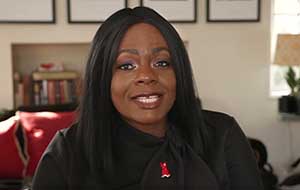
Obesity and Jobs in Socioeconomically Disadvantaged Communities
Objective: To investigate whether an intervention targeted at obesity (the Diabetes Prevention Program), in addition to job accessibility services and legal aid will result in maintenance of or lower body weight/body mass index (BMI) and improved cardiovascular health. We will also assess the relationship between psychological stress, impulsive behavior particularly related to weight, certain cardio-metabolic/aging measures of heart disease risk and our intervention on BMI and cardiovascular health.Dianna Milewicz, PhD, MD
2019

Molecular Pathogenesis of Occlusive Cerebrovascular Disease Resulting from ACTA2 Mutations
Objective: Vascular smooth muscle cells (SMCs) are found in blood vessel walls. A key protein in SMCs, smooth muscle alpha actin (ACTA2), was previously thought to mainly have a role in SMC contraction. We have found that ACTA2 has other roles, as it goes into the nucleus of the SMC and influences the expression of other genes. This can change SMC function and lead to diseases like strokes. This study will investigate this process.Louise McCullough, MD, PhD, FAHA
2020
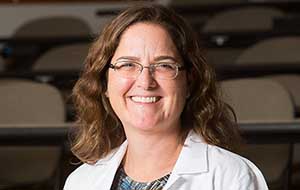
Maternal Factors Influencing Trans-Generational Stroke Risk
Objective: To determine if the maternal microbiome can influence stroke sensitivity in their offspring. This work will identify if components of the maternal microbiome influence later stroke risk. If we find specific bacteria or metabolites that are enriched in offspring, we may be able to reverse this inherited susceptibility. This work has high potential to transform stroke science.Mesdames Presidents of the AHA
Since 1965, when Helen Taussig served as the first female president of the AHA, until Michelle Albert's term ended in 2023, 11 females have led the organization in the highest medical volunteer position.
Michelle A Albert, MD, MPH, FAHA - 2022-2023
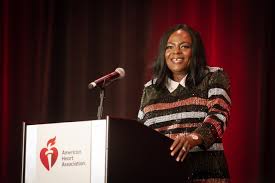 Dr. Albert is the first woman of color and Black female to serve as AHA president and the first person in history to concurrently serve as president of three distinguished cardiovascular medical societies. Currently, she is the Walter A. Haas-Lucie Stern Endowed Chair in Cardiology and Professor in Medicine at the University of California at San Francisco (UCSF), Admissions Dean for UCSF Medical School and Director of the Center for the Study of Adversity and Cardiovascular Disease. Dr. Albert was the recipient of AHA's most prestigious award, the Merit Award, in 2018 (see more above on this page). She also received a COVID-10 Rapid Response Grant in 2020.
Dr. Albert is the first woman of color and Black female to serve as AHA president and the first person in history to concurrently serve as president of three distinguished cardiovascular medical societies. Currently, she is the Walter A. Haas-Lucie Stern Endowed Chair in Cardiology and Professor in Medicine at the University of California at San Francisco (UCSF), Admissions Dean for UCSF Medical School and Director of the Center for the Study of Adversity and Cardiovascular Disease. Dr. Albert was the recipient of AHA's most prestigious award, the Merit Award, in 2018 (see more above on this page). She also received a COVID-10 Rapid Response Grant in 2020.Mariell Jessup, MD, FAHA - 2013-2014
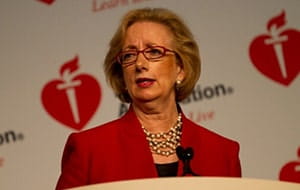 Dr. Jessup is a renowned thought leader in heart failure research, prevention and treatment. In addition to serving as AHA president, she chaired the ACC/AHA Heart Failure Guidelines writing group in 2009 and the Association’s Committee on Scientific Sessions Program In 2009 and 2010. She received the AHA's highest honor, the 2018 Gold Heart Award. Dr. Jessup is the current AHA chief science and medical officer.
Dr. Jessup is a renowned thought leader in heart failure research, prevention and treatment. In addition to serving as AHA president, she chaired the ACC/AHA Heart Failure Guidelines writing group in 2009 and the Association’s Committee on Scientific Sessions Program In 2009 and 2010. She received the AHA's highest honor, the 2018 Gold Heart Award. Dr. Jessup is the current AHA chief science and medical officer.Donna K Arnett, PhD, MPH, FAHA - 2012-2013
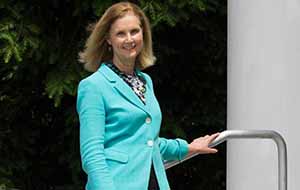 After suffering a stroke at the age of 27, Dr. Arnett went on to become an epidemiologist, clinical research nurse, and higher education administrator and was the first epidemiologist to become president of the AHA. During her AHA presidency, she served as professor and chair of the Department of Epidemiology in the UAB School of Public Health. In 2015, she become the Dean of the University of Kentucky College of Public Health, and in 2022, was appointed to Provost at the University of South Carolina. Arnett was named a World Expert in Hypertension by Expertscape after being in the top 0.8 percent of scholars who publish about hypertension over the previous ten years. Early in her career, Dr. Arnett received and was supported by an AHA Postdoctoral Fellowship.
After suffering a stroke at the age of 27, Dr. Arnett went on to become an epidemiologist, clinical research nurse, and higher education administrator and was the first epidemiologist to become president of the AHA. During her AHA presidency, she served as professor and chair of the Department of Epidemiology in the UAB School of Public Health. In 2015, she become the Dean of the University of Kentucky College of Public Health, and in 2022, was appointed to Provost at the University of South Carolina. Arnett was named a World Expert in Hypertension by Expertscape after being in the top 0.8 percent of scholars who publish about hypertension over the previous ten years. Early in her career, Dr. Arnett received and was supported by an AHA Postdoctoral Fellowship.Alice K Jacobs, MD, FACC, FAHA, MSCAI - 2004-2005
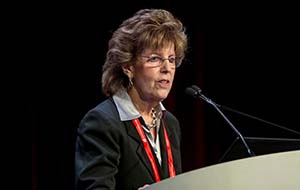 Dr. Jacobs is a renowned expert in interventional cardiology, coronary revascularization, and sex-based differences in cardiovascular disease. Her research interests focus on coronary revascularization strategies and sex-based difference in ischemic heart disease. In addition to serving as president, she worked as the leader of AHA's Mission: Lifeline, which has now expanded to include out-of-hospital cardiac arrest and stroke systems of care. The AHA recognized Dr. Jacobs with the James B. Herrick Award for Outstanding Achievement in Clinical Cardiology by the Council on Clinical Cardiology and the AHA National Gold Heart Award.
Dr. Jacobs is a renowned expert in interventional cardiology, coronary revascularization, and sex-based differences in cardiovascular disease. Her research interests focus on coronary revascularization strategies and sex-based difference in ischemic heart disease. In addition to serving as president, she worked as the leader of AHA's Mission: Lifeline, which has now expanded to include out-of-hospital cardiac arrest and stroke systems of care. The AHA recognized Dr. Jacobs with the James B. Herrick Award for Outstanding Achievement in Clinical Cardiology by the Council on Clinical Cardiology and the AHA National Gold Heart Award.Rose Marie Robertson, MD, FAHA - 2000-2001
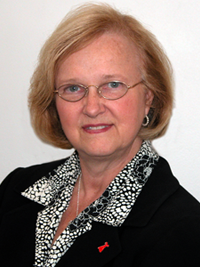 Rose Marie Robertson is chief science officer of the American Heart Association. In this role, she is responsible for overall science and medical policies and initiatives, including the AHA's work to support and accelerate biomedical research, publishing the leading medical journals in cardiovascular and stroke science, and providing a home for the broad range of professional members of the association.
Rose Marie Robertson is chief science officer of the American Heart Association. In this role, she is responsible for overall science and medical policies and initiatives, including the AHA's work to support and accelerate biomedical research, publishing the leading medical journals in cardiovascular and stroke science, and providing a home for the broad range of professional members of the association.Before joining the association staff in 2003, she served as a longtime volunteer, including a term as president in 2000-01.
Dr. Robertson is professor of medicine at Vanderbilt University Medical Center, where she created and directed the Vanderbilt Women’s Heart Institute. Her academic research career has focused on autonomic cardiovascular control and was supported by five AHA research awards in the 1980s.
Martha N Hill, RN, PhD, FAHA - 1997-1998
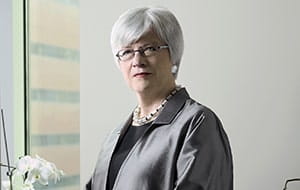 While serving as associate professor and director of Hopkins' Center for Nursing Research, Dr. Hill became the AHA's first non-physician president. Prior to this role, she served AHA's Council of Affairs Committee and Nursing Council. She went on to serve as Dean of the Johns Hopkins School of Nursing and Professor of Nursing, Medicine, and Public Health at Johns Hopkins University where she led research studies on preventing and treating hypertension and oversaw NIH-funded clinical trials.
While serving as associate professor and director of Hopkins' Center for Nursing Research, Dr. Hill became the AHA's first non-physician president. Prior to this role, she served AHA's Council of Affairs Committee and Nursing Council. She went on to serve as Dean of the Johns Hopkins School of Nursing and Professor of Nursing, Medicine, and Public Health at Johns Hopkins University where she led research studies on preventing and treating hypertension and oversaw NIH-funded clinical trials.Suzanne Oparil, MD, FAHA - 1994-1995
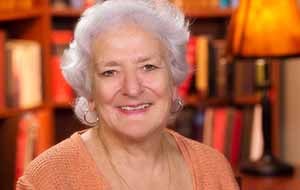 Dr. Oparil is cardiologist who has had special interest in the fundamental mechanisms of cardiovascular disease and the development of novel therapies for systemic and pulmonary hypertension and heart failure. She researches novel approaches to treat hypertension as well as organ damage related to treatments. In addition to serving as president for the AHA, she also held the position for the American Society of Hypertension and American Federation for Clinical Research. Dr. Oparil held six AHA research awards over a 25 year span.
Dr. Oparil is cardiologist who has had special interest in the fundamental mechanisms of cardiovascular disease and the development of novel therapies for systemic and pulmonary hypertension and heart failure. She researches novel approaches to treat hypertension as well as organ damage related to treatments. In addition to serving as president for the AHA, she also held the position for the American Society of Hypertension and American Federation for Clinical Research. Dr. Oparil held six AHA research awards over a 25 year span.
Bernadine Healy, MD - 1988-1989
 Dr. Healy was a cardiologist and the first female director of the National Institutes of Health (NIH). During her time as AHA president, her primary mission was to convince the public and medical community that heart disease was also a woman's disease, "not a man's disease in disguise." She attended Harvard Medical School on a full scholarship and was one of 10 women in her class of 120. After graduating cum laude and finishing her post-doctoral training, she was the first woman to join Harvard Medical School's full-time faculty in cardiology.
Dr. Healy was a cardiologist and the first female director of the National Institutes of Health (NIH). During her time as AHA president, her primary mission was to convince the public and medical community that heart disease was also a woman's disease, "not a man's disease in disguise." She attended Harvard Medical School on a full scholarship and was one of 10 women in her class of 120. After graduating cum laude and finishing her post-doctoral training, she was the first woman to join Harvard Medical School's full-time faculty in cardiology.Mary Jane Jesse, MD - 1982-1983
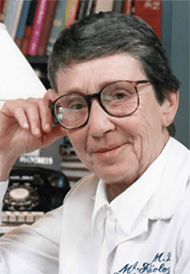 Dr. Jesse graduated from the College of Physicians & Surgeons, Columbia University at the age of 41. She was board certified in both pediatrics and cardiology. At age 67, she became the Associate Senior Vice President and Associate Provost for Health Affairs and president-elect and president of the American Heart Association. After her AHA term of office, she became the Senior Vice President for Scientific Affairs.
Dr. Jesse graduated from the College of Physicians & Surgeons, Columbia University at the age of 41. She was board certified in both pediatrics and cardiology. At age 67, she became the Associate Senior Vice President and Associate Provost for Health Affairs and president-elect and president of the American Heart Association. After her AHA term of office, she became the Senior Vice President for Scientific Affairs.Harriet P Dustan, MD - 1976-1977
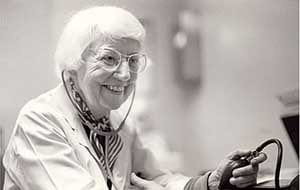 Dr. Dustan, a physician know for pioneering effective detection and treatment of hypertension, served as the AHA's second woman president. In addition, she also chaired the Ethics and Research Committees, and was the first editor-in-chief of the Hypertension journal. She was the first woman to serve on the Board of Governors of the American Board of Internal Medicine in 1987, she became 1 of 12 Distinguished Physicians (DP) of the United States Veterans Administration in their Department of Medicine and Surgery.
Dr. Dustan, a physician know for pioneering effective detection and treatment of hypertension, served as the AHA's second woman president. In addition, she also chaired the Ethics and Research Committees, and was the first editor-in-chief of the Hypertension journal. She was the first woman to serve on the Board of Governors of the American Board of Internal Medicine in 1987, she became 1 of 12 Distinguished Physicians (DP) of the United States Veterans Administration in their Department of Medicine and Surgery.Helen B Taussig, MD - 1965-1966
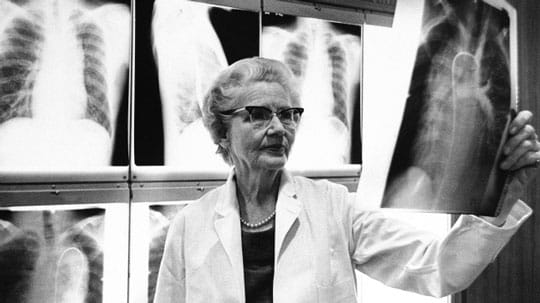 Dr. Taussig was the first female and first pediatric cardiologist to serve as president of the American Heart Association. She is most notable for her work with Dr. Alfred Blalock to develop the famous Blalock-Taussig bypass operation to alleviate "blue baby" syndrome and for her investigation regarding the dangers of Thalidomide.
Dr. Taussig was the first female and first pediatric cardiologist to serve as president of the American Heart Association. She is most notable for her work with Dr. Alfred Blalock to develop the famous Blalock-Taussig bypass operation to alleviate "blue baby" syndrome and for her investigation regarding the dangers of Thalidomide.
Denied the opportunity to earn degree at Harvard School of Public Health for being a woman, Dr. Taussig went on to achieve many firsts: The first woman to be made a full professor at Johns Hopkins Medical School, the first woman Master in the American College of Physicians, and one of the first 20 women in the United States to be inducted into the Women's Hall of Fame. In 1964, she was awarded the Presidential Medal of Freedom, the highest civilian honor bestowed by the American government. Dr. Taussig was the recipient of multiple AHA research funding awards for her work in 1956-58; 1958-60; 1961-64; 1964, and 1973-76.
Other Notable Women in Research
Svati Shah, MD, MHS, FAHA
Dr. Shah currently serves as the Research Committee chairperson and oversees and executes strategies to achieve the AHA Research Essential Elements, which include research funding, investigator development, accountability and optimization. She is a physician-scientist focused on translational research to better understand metabolic and genetic pathways of cardiometabolic diseases. In 2022, she received the AHA's Genomic and Precision Medicine Mentoring Award.
Doris Taylor, PhD
In 2008, Dr. Taylor, a scientist working in regenerative medicine and tissue engineering, led the team that announced the creation of the world's first bioartificial mammalian heart. She Is a multiple recipient of research award funding from the AHA in1995-1997, 2009-2013 (DeHaan), 2009-2012 (DeHaan).
Lindsay Allen, MD, FRCP
Dr. Allen is a pediatric cardiologist who devised a method of visualizing the most important features of the fetal heart in the early 1980's. She showed that it was possible to differentiate between normal and abnormal anatomy, and to identify specific congenital malformations well before birth. She later became involved in the first attempts to correct congenital abnormalities in unborn children. Dr. Allen received AHA research funding for her work in 1994-97.
Katalin Karikó, PhD
Dr. Karikó was the recipient of the 2023 Nobel Prize in Physiology or Medicine (along with Drew Weissman, MD, PhD) for seminal studies into messenger RNA (mRNA), a molecule vital to developing the COVID-19 vaccine. She received two research grants from the AHA -- a Beginning Grant-in-Aid in 1991 and a Standard Grant-in-Aid in 1993.
